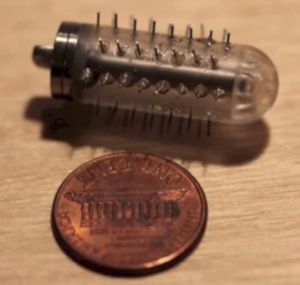2 October 2014. Researchers designed and tested in animals a pill with tiny needles that could deliver some of the same biologic drugs now using injections. The team of engineers and medical researchers from the lab of Robert Langer at Massachusetts Institute of Technology, with colleagues from Massachusetts General Hospital and Technion in Israel, published its findings last week in Journal of Pharmaceutical Sciences (paid subscription required, but open access version available).
Most patients prefer taking pills rather than injections, but pills are not feasible for insulin and other biologic therapies made of large proteins, such as antibodies and recombinant DNA or RNA, which are not easily absorbed or degraded in the gastrointestinal tract. Biologics are used to treat cancer and auto-immune disorders, such as rheumatoid arthritis and multiple sclerosis. Creating oral versions of biologics often involve creating micro- or nanoscale particles, which require designing new formulations of each drug.
The MIT team, led by first author Giovanni Traverso, sought a different approach that would maintain the original drug formulation, but transport it in a capsule with tiny needles that could survive the gastrointestinal track, and still deliver the payload. The researchers created a capsule made of acrylic, 2 centimeters long and 1 centimeter in diameter, with hollow needles 5 millimeters in length protruding from it. The capsule used for the study also has a chamber to store the drug payload and a metal core to make it visible on X-rays.
If ingesting an object with sharp points — no matter how small — seems unsafe, the authors note that the gastrointestinal tract has no pain receptors, and can pass an object that small without complications. A review of cases where humans accidentally swallow foreign objects, even sharp objects, shows surgical removal was needed for sharp objects 3 centimeters and longer, much larger than the 5 millimeter length of the micro-needles on the capsule. In addition, micro-needles are used or being tested for drug delivery in other parts of the body.
The researchers tested the micro-needle capsule as a delivery mechanism for insulin in pigs, weighing 75 to 80 kilograms (165 to 176 lbs.), which were sedated and given the capsules with a feeding tube into the stomach. The capsules were followed through the pigs’ gastrointestinal tracts with endoscopes and X-rays, and observed for any damage to internal organs. Other pigs were given subcutaneous (under the skin) insulin injections for comparison. Blood glucose levels of both sets of animals were measured.
The team found the micro-needle capsules delivered insulin into the pigs’ stomach linings, and small and large intestines, with faster response to insulin and with greater blood glucose decreases than in pigs receiving injections. The capsules took from 1 to 8 weeks to pass completely. Subsequent examinations showed no tissue damage to the pigs receiving the capsules.
While these first proof-of-concept tests used insulin, the researchers believe the technology can be applied to other biologics. They are working on alternatives to metal for micro-needles, such as degradable polymers, to address safety concerns. The team is also redesigning the capsule to take advantage of contractions in the digestive tract that could squeeze out the drug payload in waves rather than a continuous flow.
Traverso and other authors filed a provisional patent with the U.S. Patent and Trademark Office for the technology. The following video tells more about their invention.
- Novartis Licensing Smart Lens Technology from Google
- Nanotech Technique Devised for Real-Time Intestinal Images
- Ultrasound-Triggered Hydrogel Shown to Deliver Cancer Drug
- Wireless Power System Invented for Miniaturized Implants
- Laser Activation Tested as Potential Cancer Drug Delivery
* * *


 RSS - Posts
RSS - Posts
You must be logged in to post a comment.